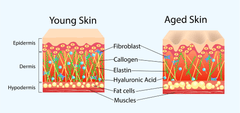What causes skin ageing?
Increasing years affects all of the human body but it is often our outward-most organ, the skin, that is the visual reminder of advancing age. Biology of the skin is complex and there are many variables, both internal and external, which can influence how quickly and to what degree an individual’s skin will appear as ‘aged’. How the skin ages is vital to understanding what techniques can attempt to counteract these processes by the use of specific cosmetic ingredients in skin-suitable formulations.
What Is Skin Ageing?
Skin ageing means different things to different people. Typically, it can mean emergence of fine lines and wrinkles, pigmentation or age spots, dry or dull skin or a combination of all these.
Here’s what happens from a biology point of view.
The Skin Ageing Process

Epidermis
- Epidermis (skin’s outermost layer) becomes thinner which can lead to an increase in dehydration. This means the skin surface will become drier, more scaly and with fine lines. The barrier function can be reduced therefore decreasing the skin’s ability to protect from UV exposure.
- Desquamation (shedding of the outer layer) decreases with age as there is slower cell turnover. This leads to rough, dull skin and less efficient wound healing.
- There are a reduction in melanocytes (pigment making cells) which results in paler complexions and therefore again, less protective cover from UV light. Sometimes the distribution of melanocytes becomes disruptive leading to age spots and pigmentation.
Dermis
- The dermis provides the skin with its strength and resilience due to the presence of structural components such as collagen and elastin. As skin ages, the distribution of collagen can become more disorganised and sometimes unravelling of the previous tightly packed fibres. This results in loss of firmness in the skin
- Elastin becomes fragmented and disorganised, leading to less taut and sagging skin.
- There is a reduction in other materials including glycosaminoglycans (GAGs), of which hyaluronic acid is a well-known example. This results in less retention of water in the dermis which affects skin structure and leading to further wrinkling and loss of elasticity.
This complex biological deterioration of the skin is determined by a number of internal and external processes, examples of which are seen in the table below.
Factors affecting skin ageing |
|
|
Internal |
External |
|
Genetics |
UV exposure/Photodamage |
|
Ethnicity |
Pollution |
|
Metabolism |
Smoking/nicotine |
|
Hormones |
Nutrition |
|
Illness |
Medication |
|
Frowning |
|
Whilst natural ageing of skin is inevitable, it is the external factors which can influence when the skin ages, the rate of skin ageing and by how much. So whilst we cannot do much about our internal makeup, there are ways to control the external factors mentioned above.
Some reports suggest that the effects of UV light on the skin, in particular, can account for up to 90% of visible skin ageing!
Why is UV light is so damaging to our skin?
UVA can penetrate deep in to the dermis and invoke DNA structural and functional damage via its generation of free radicals. These free radicals eventually form destructive enzymes known as metalloproteinases (MMPs), which degrade collagen and elastin, leading to wrinkles in sun exposed areas.
The skin tries to protect itself from further UV exposure by increasing melanin (pigment) production leading to pigmentation and age spots.
How to reduce the ageing of our skin.
Skin ageing due to internal factors cannot be changed by human behaviour so it is better to concentrate efforts on delaying external ageing. Since UV light is such a major player in this process, it makes sense to counteract this. Protecting our skin, with appropriate sunscreen, from the harmful affects of UV rays is one of the best ways to delay skin ageing.

But how can I help my skin if I already look ‘aged’?
To minimise skin ageing features and protect from further deterioration, certain ingredients may help.
Retinoids are well-known as the most effective in this area as studies have shown increases in dermal collagen and a reduction in destructive enzymes, to improve the appearance of wrinkles.
Alpha Hydroxy Acids (AHAs) can help accelerate the cell turnover rate and can help the outer skin slough off it’s dead skin layer, helping the skin appear less dull and with smoother texture.
Hyaluronic acid is used as a filler but is a common skincare ingredient. It’s high ability to bind water means it is often used in moisturising serums and creams to hydrate the skin
Vitamin C is an antioxidant which has been shown to regulate collagen production and also brightens the skin. The issue with Vitamin C is that is difficult to formulate with as it is unstable in light.
Looking younger for as long as possible is an ambition for many. Prevention is key to this and it is never too late to start using sunscreen products. However, other products maybe beneficial to skin which is already showing signs of ageing. Look to retinoids, AHAs, antioxidants and hydrating ingredients for ways to improve the appearance of fine lines or wrinkles and to even out skin tone.
Feel free to message me about this topic if you have any questions
Michelle








